* Trigger Warning: this article contains mention of assault and violence
The 26th iteration of the Poetry Africa Festival kicked off on the 6th of October and ran until the 16th. For the first time, the events were spread across two cities, with the Johannesburg leg starting proceedings before they move to Durban on the 10th.
This year’s theme, as presented by the Centre for Creative Arts at the University of KwaZulu-Natal, is Poetic (In)Justice: Voices that Breathe, Move and Transform. Featured poets in the categories of Legendary and New Generations were Diana Ferrus and Xabiso Vili respectively.
Diana Ferrus delivered the keynote address online on Monday, 10 October at 3 pm, thus inaugurating the programme’s third location: the internet. A dense roster, including the Mafika Gwala lecture, is available electronically for those who were unable to move between the two cities, but would still like to participate in the festivities.
Below is select coverage of the Johannesburg leg.
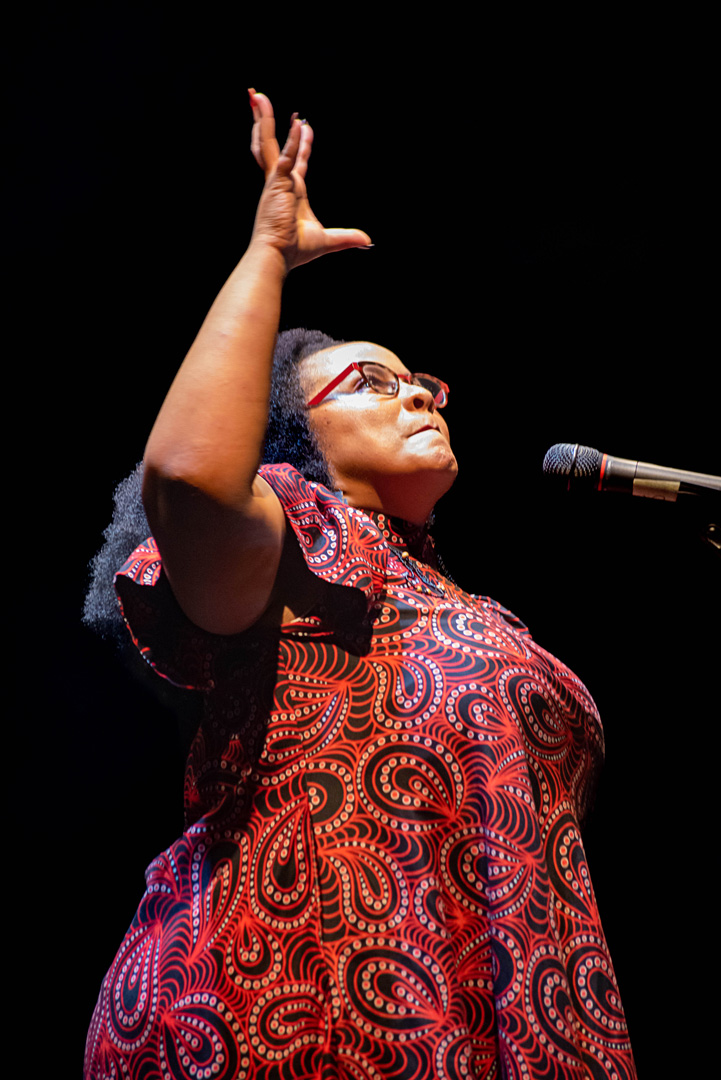
Photograph by Lindo Mbhele
What’s a Woman’s Worth? (6 Oct)
The provocation for the opening night of Poetry Africa invited us and a cross-generational selection of black and brown poets to deliberate on the attributes that constitute a woman’s worth. How has the enshrinement of human and women’s rights in the Universal Declaration of Human Rights as well as the Bill of Rights, affected how we think and talk about the challenges women face in defining their value? In a country awash in gender-based violence and occupational inequality, this focus on women by women performers is not only necessary but constructive in its exploration of the degradation and celebration that determine a woman’s worth.
The lineup of featured poets at the Keorapetse Kgositsile Theatre was headlined by Lebo Mashile, Phillippa Yaa De Villiers, vangile gantsho, Nomashenge, Belita Andre, and Roché Kester.
With a start time of 19h00 at the poshly decked UJ Arts Centre, wrangling six slam poetry sets, housekeeping announcements, and introductory speeches in 90 minutes proved to be a challenging handle for host Siphindile Hlongwa.
By the time Roché Kester appears on stage, 45 minutes have elapsed, but Johannesburg’s enthusiasm is not dulled. The audience is simply happy to be included in this year’s proceedings. “Roche!” shouts a familiar from somewhere behind me, but the poet shuts him up with an aggressive, “Shhh! Listen to the poet.”
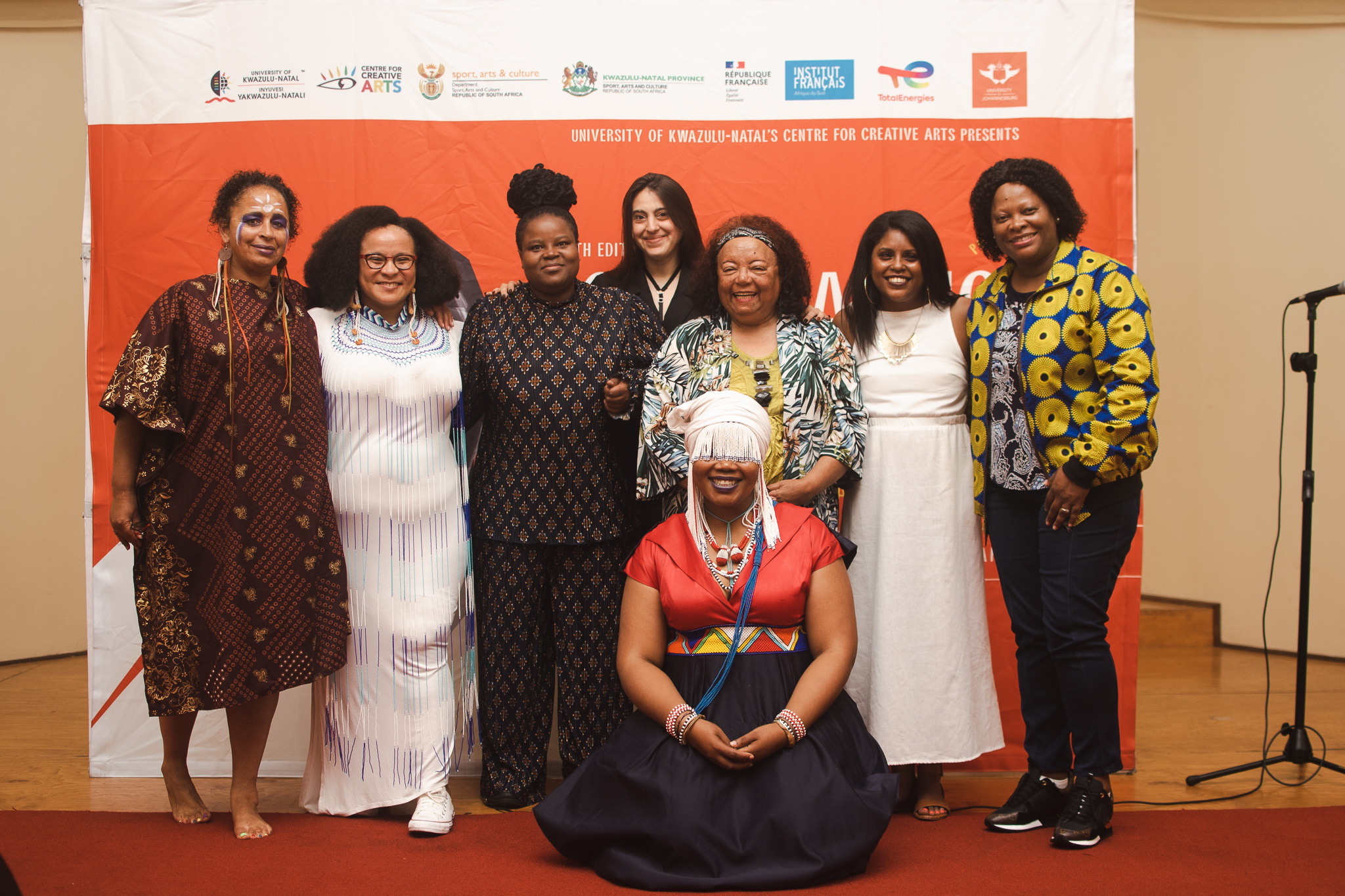
Photograph by Niamh Walsh-Vorster
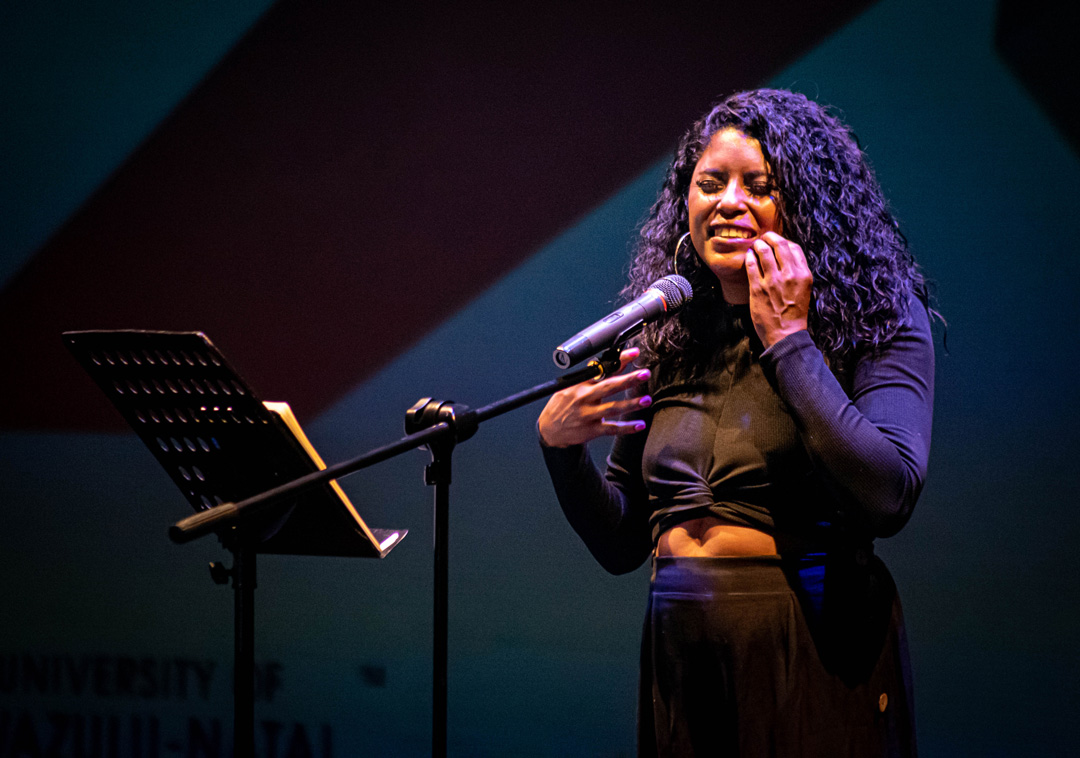
Photograph by Lindo Mbhele
Before her introductory speech emphasises her Indian appearance, brown culture, and black political identity, Kester sets the ground rules with a poem that outlines the responsibility of the listener to the poet and vice versa. Those who have carried hurt into the auditorium are invited to heal alongside the speaker, as she poetically unpacks her intersectional baggage.
“I have a lot of problems,” she admits, as a queer woman of colour with depression, who is also a survivor. Writing the trauma is a coping mechanism reflected in selections that address sexual assault and mental health. “I am not a sad person, though,” she reassures the audience before a final poem celebrating the sexual discernment exercised by her vulva, which is the cue for a visibly pregnant Belita Andre to enter the stage full of meaning and life.
“Just to give you a quick view,” the Pomfret-born poet whispers in profile, the better for us to see her baby bump. The knowledge that there are two beings onstage imbues Andre’s set with gravitas. Her tonality and movement trust in this quiet power, eschewing the demonstrativeness usually associated with performance poetry. The subject matter tends to be melancholy with refrains that demarcate poems that would otherwise segue into each other. Sometimes she helps the listener with a humble, “Thank you,” but mostly quietly ploughs on. A cultured singing voice is held in restraint so as not to overpower her import with effect, in a literary set that lends itself to the stage as well as the page.
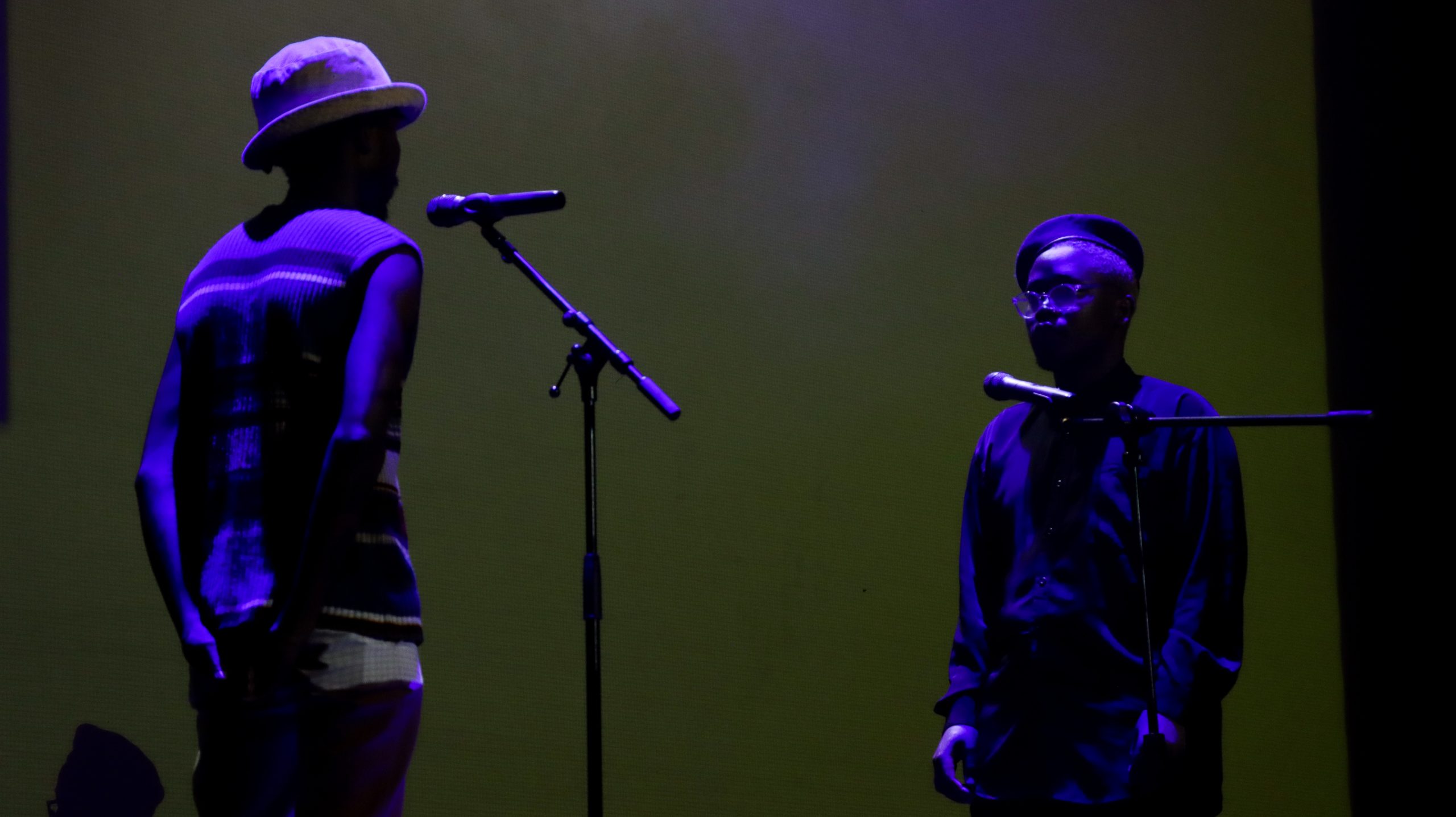
Photograph by Kitso Sedumedi
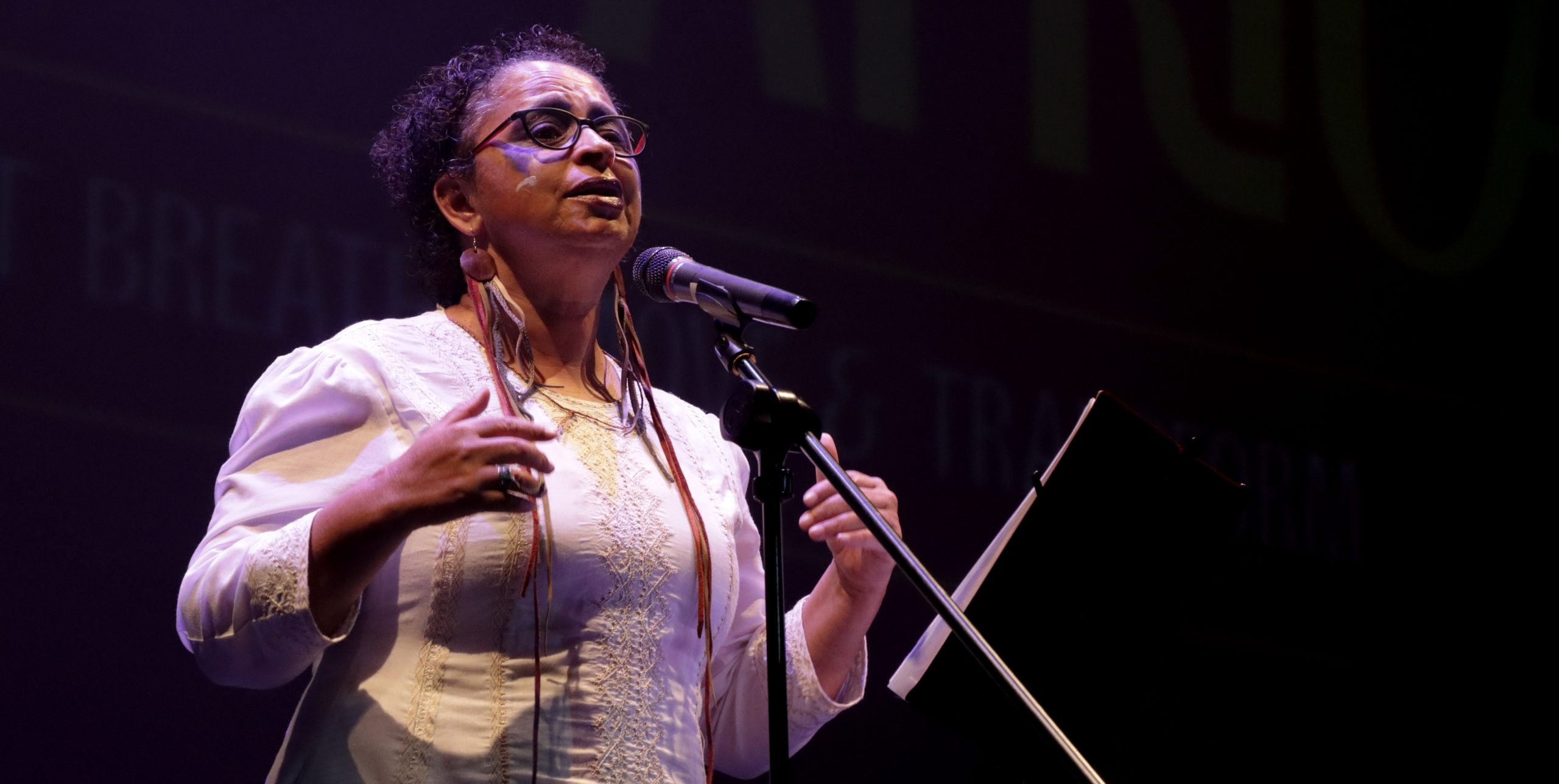
Photograph by Kitso Sedumedi
Phillippa Yaa De Villiers rounds out the pre-intermission entertainment with a set as eccentric as Andre’s was pensive. Her material ranges from a struggle to fit into a pair of jeans and day-drinking during lockdown, to a tribute to Keorapetse Kgositsile and a portrayal of Christ as a woman. De Villiers ramps up the performativity with stamps, screeches and swoons, then brings the crowd down into her bosom with intimate sidebars between readings. The stagecraft is masterful as the audience is kept at the very edge of equilibrium.
It is 21h05 by the time Hlongwa permits the attendees a 10-minute break. With catering to be consumed and mingling to be done after the show, events might wrap up well after 23h00. I lament the 45-minutes of speeches with which we started and follow those up the stairs who do not want to test the availability of Ubers just before midnight on a Thursday.
Tilting the Scales (8 Oct)
That night’s theme was disruption at the levels of form and content. The lineup was described as non-conformist in performance, poetry making, as well as social convention. It falls upon Thando Fuze, Sabelo Soko, Lydol, Modise Sekgothe, Xabiso Vili, Mana Bugallo, and Siphokazi Jonas to translate their creative practice into transformative activism. The first poet on stage, Thando Fuze, responds positively to this provocation at UJ’s homely Bunting Theatre.
The Durban-based poet’s work centres on family, love, childhood, and politics, which are just some of the things we have in common as human beings. She begins with a recollection of the lessons learned in first grade, all of which prepare the six-year-olds in class for the world of gender-based violence they are to inherit. Nursery rhymes break up harrowing tales of violence perpetrated against women for reasons ranging from sexuality to excellence in “typically male” pursuits. “By the time I was nine I could tap a football 200 times,” asserts Fuze: a fact which made the boys on her street afraid of her. The poet explores this fear over the length of a single poem spanning the length of her set, showing how it feeds male entitlement and the patriarchal prescriptions that underpin atrocities such as corrective rape.
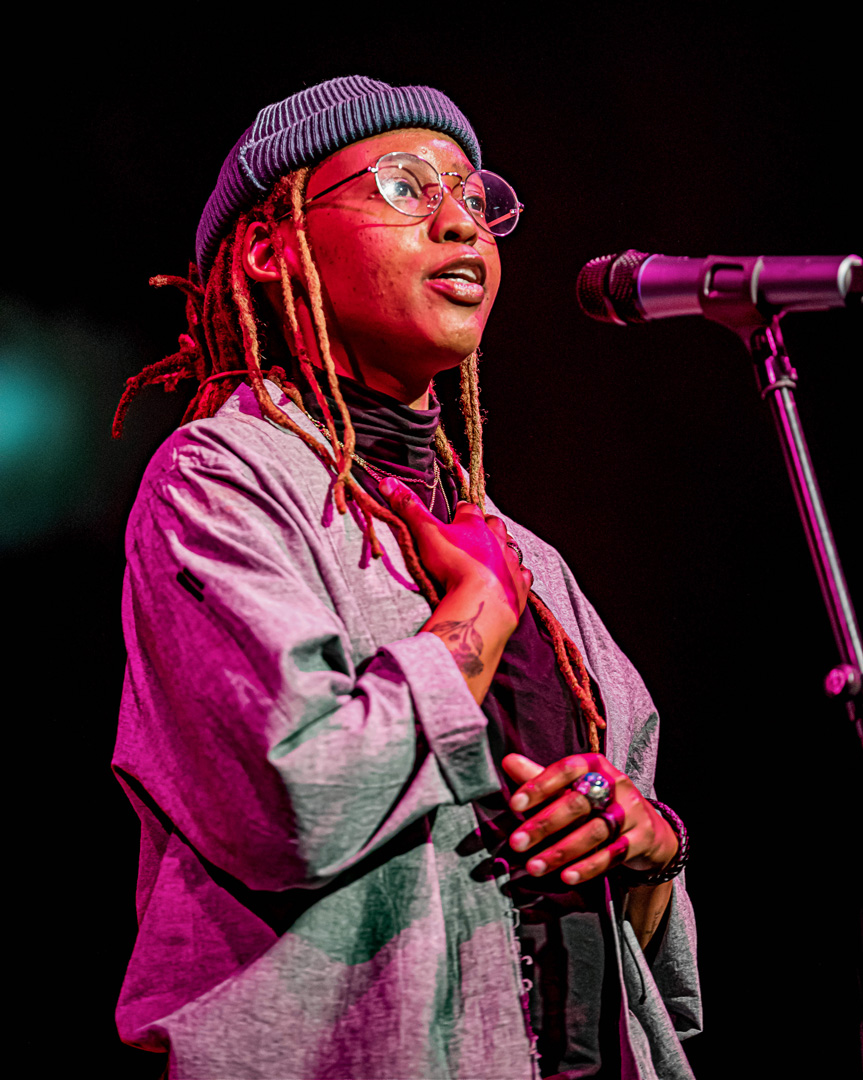
Photograph by Lindo Mbhele
At the centre of our failure to protect our community members is the complicity demonstrated by neighbours who allow domestic violence to go unchecked until it is too late. Sabelo Soko – second on stage – concerns himself with nothing if not the state of our communities. His subscription to the philosophy of “spinning” lays bare his loyalties, as he explains that it comes from car thieves who did their dirt out of town to plough the plunder into their impoverished neighbourhoods. His largely vernacular set speaks to the erosion of communal values brought on by the encroachment of social media culture. Neighbours used to ask each other to watch the kids and take in the washing should it rain while on an errand to make a phone call, he laments. Now our communities are characterised by the fear and competition that go hand in hand with capitalist consumerism.
From the multilingual melting pot that is Cameroon, hails a poet whose rootedness in humble beginnings is symbolised by the bare feet with which she traverses the stage. The path to slam poetry stardom, a doctoral degree in economics, and social activism began with homelessness, begging on the streets alongside her mother. Trauma collected in a school massacre in which eight of fifteen pupils survived makes it into the swathe of West African material she brings to the Joburg stage. Snippets on love and womanhood are woven, in a set made for audiences unfamiliar with her work.
As usual, we broke for intermission forty minutes after the advertised ending time. Again, there were speeches that ran overtime after a late start. Perhaps it is the ingrained art-scene culture to ease into events with fashionable nonchalance, but as a courtesy to reviewers with multiple commitments, the organisers of Poetry Africa would do well to keep to the schedule in the Durban leg of events.
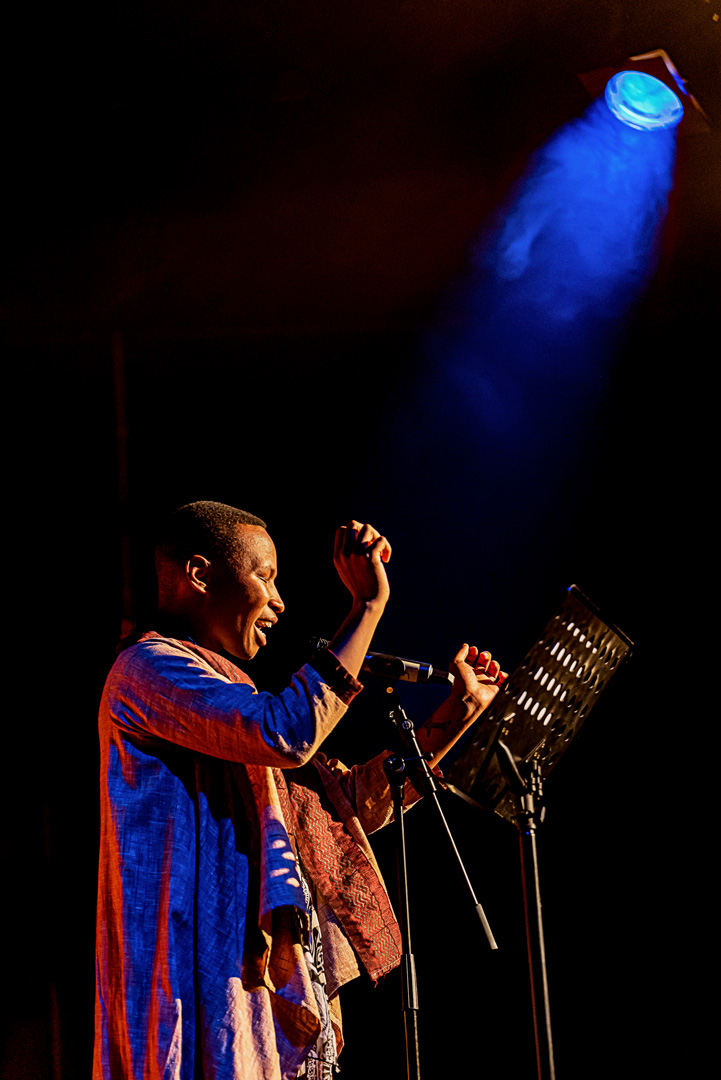
Photograph by Lindo Mbhele



















































